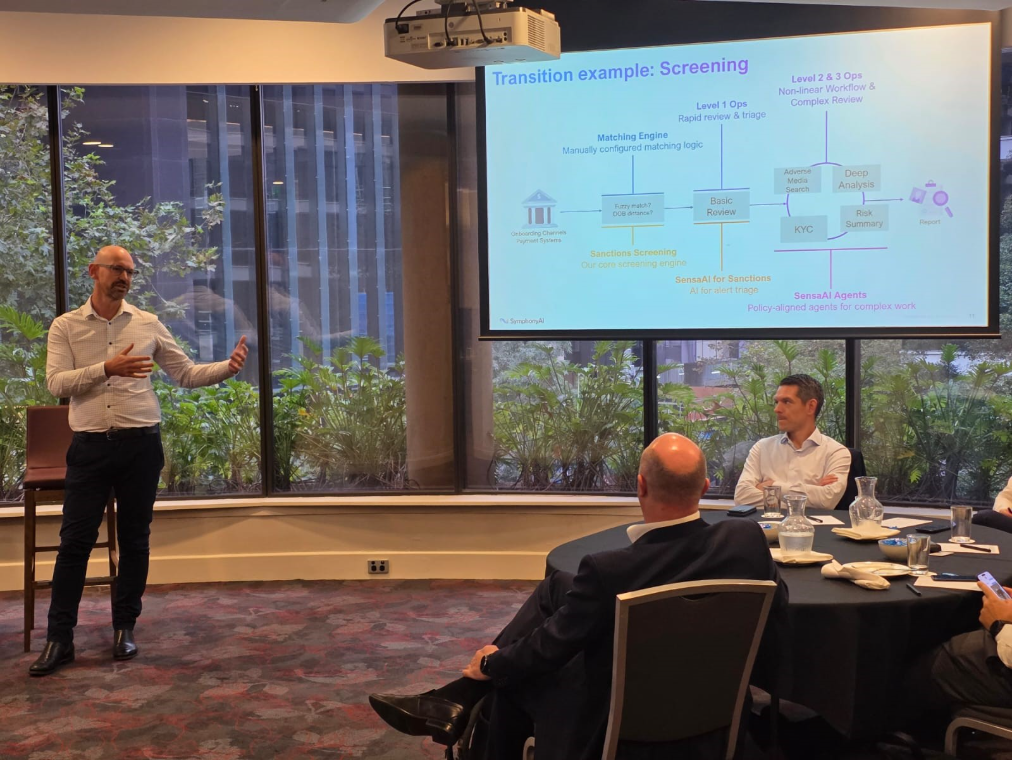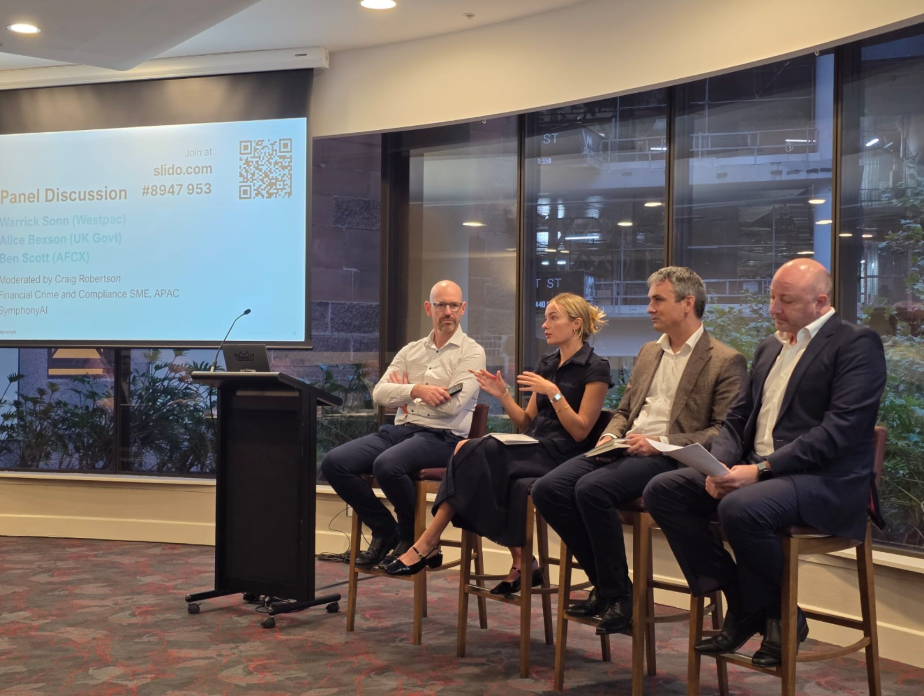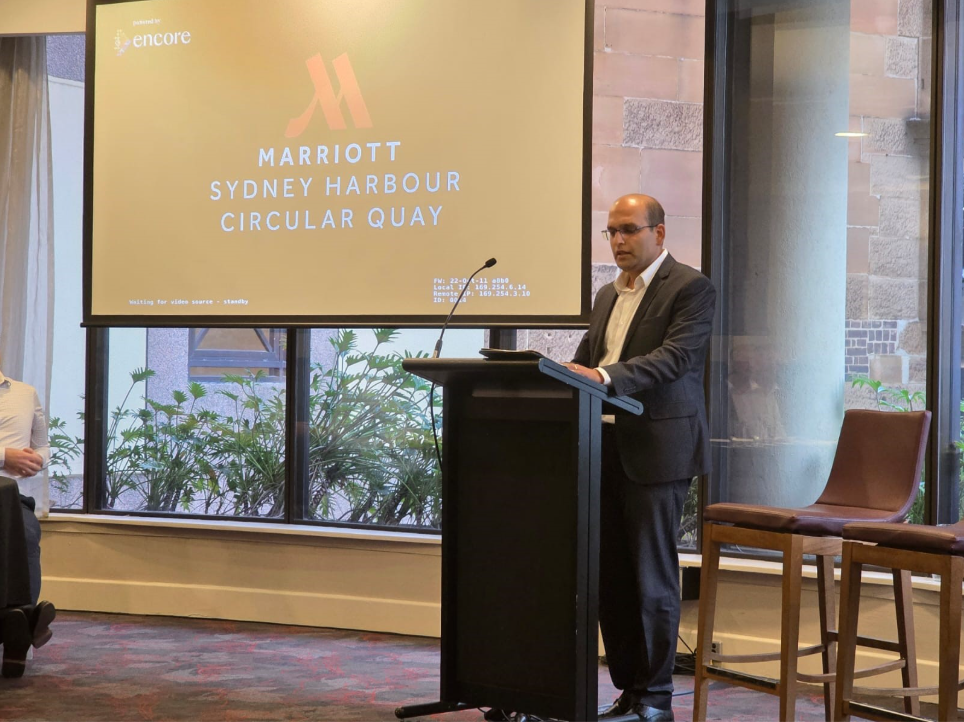Table of Contents
The Financial Crime and Compliance Customer Insights Forum in Sydney featured representatives from nine financial services organizations
Financial crime compliance professionals gathered in Sydney, Australia as SymphonyAI relaunched the Financial Crime and Compliance Customer Insights Forum for 2025. The event brought together leaders from nine financial services and related organizations spanning Australia, New Zealand, and the Pacific. These included representatives from the likes of Deloitte, the Australian Financial Crimes Exchange (AFCX), and the British High Commission.

Craig Robertson talks about screening at the Financial Crime and Compliance Customer Insights Forum in Sydney, Australia
The forum couldn’t have come at a more critical time. The Australian financial services sector faces immense challenges in 2025 and 2026, including the implementation of Anti-Money Laundering (AML) reforms, the Scams Prevention Framework (SPF), and additional legislative updates related to privacy and payments.
Across Australia, New Zealand, and the Pacific, financial institutions are striving to:
- Drive efficiency in operations
- Build strategic financial crime capabilities to stay ahead of regulatory demands
- Adopt Artificial Intelligence (AI) to support their contemporary detection and workflow solutions
Against this backdrop, SymphonyAI’s Craig Robertson, a 20-year veteran in financial crime and our Financial Crime and Compliance SME for Asia Pacific, introduced the Australasian audience to the SymphonyAI’s vision of a financial crime ecosystem.
The Australian financial services sector faces many financial crime compliance challenges
In 2025 and into 2026, the financial services sector in Australia is likely to face substantial challenges related to evolving AML and counter-terrorist financing (CTF) reforms, which could impose stringent regulatory compliance demands on financial institutions and new industries recognized as carrying a high money laundering risk (real estate, dealers of precious stones, etc.)
As Australian regulators push for more rigorous AML measures, financial institutions may struggle with the increased complexity and resource requirements necessary to meet these new standards. This could involve significant investments in advanced AI-led technology, training, and system upgrades to enhance transaction monitoring and suspicious activity reporting mechanisms. Moreover, the push towards real-time data sharing may present additional hurdles as institutions ensure they have the infrastructure and protocols in place to protect against potential data breaches and ensure compliance with evolving regulatory frameworks.
Simultaneously, the rise of sophisticated scams and fraudulent activities continues to pose a significant threat to the integrity of financial transactions in Australia. The Australian government passed the Scams Prevention Framework bill in February 2025, which requires service providers in selected sectors of the economy to take a variety of actions to combat scams relating to, connected with, or using their services.
Alongside these financial crime compliance challenges, the industry must navigate privacy concerns and regulations, such as the recent update to the Privacy Act, which insists upon careful handling of customer data to maintain trust and avoid substantial penalties.
Balancing these competing demands will be critical for Australia’s financial services to effectively address the dual challenges of innovation and security in the coming years.

A panel discussion at the Financial Crime and Compliance Customer Insights Forum featuring representatives from SymphonyAI, Westpac, UK Government, and AFCX
The future of financial crime compliance
Against the backdrop of these significant challenges, Robertson revealed the SymphonyAI vision for the next-generation of financial crime compliance. These capabilities bring together the global AI applications of SymphonyAI such as Sensa Investigation Hub, SensaAI for AML, and SensaAI for Sanctions to financial services businesses.
The idea is built on four foundational pillars to address critical challenges in financial crime risk management:
- Data management – Focuses on the efficient collection, storage, and integration of vast amounts of data from various sources to ensure high-quality, standardized data is available for analysis and decision-making. Implementing strong systems that can handle diverse data types and ensure data accuracy, integrity, and accessibility, is crucial for identifying and mitigating financial crime risks and enhancing productivity by breaking down data silos within organizations.
- Advanced risk engines – Use sophisticated algorithms and machine learning techniques to detect potentially fraudulent or suspicious activities across financial transactions. By analyzing patterns and anomalies within the data, and continuously learning from it, advanced risk engines help organizations proactively identify risks and enhance their ability to prevent and respond to financial crimes more effectively.
- Workflow automation – Streamline the processes involved in financial crime risk management by automating repetitive and manual tasks to increase operational efficiency. By using the likes of agentic AI, potential threats can be uncovered and responded to more quickly, enabling organizations to allocate their resources more effectively and focus on higher-risk areas.
- Insights and intelligence – Generate and use actionable insights derived from data analysis to improve decision-making and strategy. Providing a deeper understanding of emerging trends and risks in financial crime, insights and intelligence empowers organizations to anticipate threats and tailor their risk management approaches accordingly.
With a focus on financial crime risk management, Robertson emphasized that the platform is designed to:
- Support multiple risk detection and workflow capabilities, ensuring organizations achieve the maximum return on existing investments
- Ensure that data becomes a re-useable asset and not a burden to engage financial crime services
- Prioritize financial crime risk prevention as the number one goal
Manmohan Toshniwal, Forensic and Financial Crime Principal at Deloitte, shared his insights on the financial crime compliance challenges facing leaders today, emphasizing that the upcoming regulatory reforms in Australia present a crucial opportunity to rethink and reshape financial crime programs.
He described the current defensive, reactive approach to financial crime compliance risk management as “fighting with only a shield,” arguing that it is inadequate for addressing the complexities of modern financial crime threats. Toshniwal advocated for a shift towards more proactive strategies, combining both defensive (“shield”) and proactive (“spear”) risk management, made possible through the right technology and design choices.

Manmohan Toshniwal sharing his financial crime compliance insights in Sydney, Australia.
Advancing financial crime compliance management with SymphonyAI
The relaunch of the Financial Crime and Compliance Customer Insights Forum highlighted the urgent need for innovation and collaboration to meet the financial crime challenges of today and tomorrow.
With SymphonyAI’s vision of a platform to address critical challenges in financial crime risk management and empowering organizations, the forum reinforced the message that AI-led technology and modern workflows are the way forward.
Join us in transforming financial crime management by exploring co-pilot-led investigations and AI-enabled screening capabilities.
Read about leveraging AI in Australia’s evolving regulatory landscape.
Transform your financial crime management with SymphonyAI
Explore co-pilot-led investigations and AI-enabled screening capabilities.
